|
|
|
Sort Order |
|
|
|
Items / Page
|
|
|
|
|
|
|
| Srl | Item |
| 1 |
ID:
142996
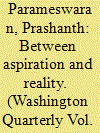

|
|
|
|
|
| Summary/Abstract |
On October 20, 2014, Indonesia—the world's fourth-largest nation, third-largest democracy, and largest Muslim-majority country—after a decade of stable leadership under Susilo Bambang Yudhoyono, inaugurated former Jakarta governor Joko Widodo as its new president. Jokowi, as he is popularly known in Indonesia, will face the daunting task of addressing the country's myriad domestic problems, while also maintaining its role abroad as a regional leader in Southeast Asia as well as a global player in important international fora like the G20 and the United Nations. Indonesian foreign policy will likely display significant continuity with the Yudhoyono years. But in translating Indonesia's foreign policy aspirations into reality, Jokowi will confront major challenges ranging from nagging resource constraints at home to incomplete political transitions and rising nationalism among Indonesia's neighbors abroad. These challenges have profound implications for U.S. policy toward Indonesia, given the closer ties between the two countries over the past few years. U.S. policymakers should factor in these realities as they fashion next steps for U.S.–Indonesia relations.
|
|
|
|
|
|
|
|
|
|
|
|
|
|
|
|
| 2 |
ID:
095596


|
|
|
|
|
| Publication |
2010.
|
| Summary/Abstract |
Despite seemingly little prospects and meager results, many developing countries invest substantial resources in regional cooperation organizations. Considering the widespread skepticism regarding the benefits of these organizations, this enthusiasm is puzzling. This study offers an answer to this puzzle and argues that under certain conditions international organizations among developing countries function as a signal of regional peace and stability. In turn, they reduce the political risk associated with foreign investment and increase the inflow of much needed capital to the economies of their members. I evaluate this argument in the context of the Association of Southeast Asian Nations (ASEAN). I show that Indonesia forcefully promoted the formation of ASEAN and that Indonesian foreign policymakers believed that joining this organization will reverse its aggressive and irresponsible image in the eyes of international donors and investors. Evidence regarding political risk and foreign direct investment in Indonesia and other ASEAN members provide additional support for the argument.
|
|
|
|
|
|
|
|
|
|
|
|
|
|
|
|
| 3 |
ID:
103900


|
|
|
|
|
| Publication |
2010.
|
| Summary/Abstract |
Despite seemingly little prospects and meager results, many developing countries invest substantial resources in regional cooperation organizations. Considering the widespread skepticism regarding the benefits of these organizations, this enthusiasm is puzzling. This study offers an answer to this puzzle and argues that under certain conditions international organizations among developing countries function as a signal of regional peace and stability. In turn, they reduce the political risk associated with foreign investment and increase the inflow of much needed capital to the economies of their members. I evaluate this argument in the context of the Association of Southeast Asian Nations (ASEAN). I show that Indonesia forcefully promoted the formation of ASEAN and that Indonesian foreign policymakers believed that joining this organization will reverse its aggressive and irresponsible image in the eyes of international donors and investors. Evidence regarding political risk and foreign direct investment in Indonesia and other ASEAN members provide additional support for the argument.
|
|
|
|
|
|
|
|
|
|
|
|
|
|
|
|
| 4 |
ID:
117736
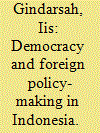

|
|
|
|
|
| Publication |
2012.
|
| Summary/Abstract |
This article studies the impact of domestic politics on Indonesia's foreign policy-making. Serving as a non-permanent member of the United Nations Security Council (UNSC) from 2007 to 2008, Indonesia voted on two key resolutions concerning the Iranian nuclear issue. While approving international sanctions against Iran under UNSC Resolution No. 1747, the Indonesian government abstained from voting on Resolution No. 1803 which imposed additional sanctions on Tehran. This article argues that the country's changing response to the Iranian nuclear issue was a consequence of domestic opposition. The case study specifically identifies the Muslim-majority population, religious mass organizations, and political parties, as key factors which weighed upon the "risk calculus" behind Indonesia's foreign policy formulation. The article concludes that while the executive still drives the countrys foreign policy, Indonesias Parliament and social-political groups have gained new powers to influence the government into changing or even reversing existing policies.
|
|
|
|
|
|
|
|
|
|
|
|
|
|
|
|
| 5 |
ID:
174734


|
|
|
|
|
| Summary/Abstract |
Indonesia has developed an internal model of reconciling the values of democracy and Islam; therefore it could pursue international activities for bringing the West and the Islamic world together. However, Indonesia’s international role as a bridge-builder between democratic values and Islam has limited effectiveness. In this paper the attempt is to investigate why Indonesia’s international activity as a bridge-builder between the West and the Muslim world is ineffective? The analysis shows, and this is the argument, that its limited effectiveness results from a conflict between the country’s conception and prescription roles. The assumptions are that Indonesia’s underlying objective in its foreign policy is to provide a tool for reconciling the West and the Muslim world (role conception); however an enactment of this role is affected by a dissonance between the authors of this role. The paper examines three empirical case studies at different levels of Indonesia’s external engagement: (1) civilizational and interfaith dialogues at the international level; (2) the Organization of Islamic Cooperation and Developing-8 at the inter-regional level; and (3) the Bali Democracy Forum at the regional level.
|
|
|
|
|
|
|
|
|
|
|
|
|
|
|
|
| 6 |
ID:
189249
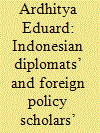

|
|
|
|
|
| Summary/Abstract |
The question of whether China’s rise to power will be peaceful cannot be evaluated without considering the actions of other major powers. Therefore, this study seeks to explore how Indonesia formulates its response to a rising China. Although previous studies have recognized the importance of perception in shaping Indonesia’s strategic response toward China, previous scholarship has not achieved a systematic investigation of Indonesians’ perception of a rising China. Therefore, this study applies image theory from international relations scholarship to carry out a qualitative content analysis of empirical data collected during interviews with Indonesian diplomats as well as foreign policy scholars. This study finds that perceiving China as presenting a degree of threat rather than opportunity is the dominant perceptual trend among individuals in this study sample. The relatively moderate degree of threats from China were characterized more as economic exploitation and political subordination, than as military attacks or occupation. However, these should be evaluated alongside findings that those individuals are more perceptually sophisticated in their approach to understanding China. This finding therefore suggests, that in the foreseeable future, Indonesian foreign affairs bureaucracy will hardly encourage Jakarta to notably shift Indonesia’s orientation toward the rising power.
|
|
|
|
|
|
|
|
|
|
|
|
|
|
|
|
| 7 |
ID:
148310
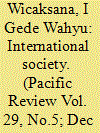

|
|
|
|
|
| Summary/Abstract |
Realism has been the dominant conceptual approach to studying Indonesian foreign policy. This article, however, considers realist analyses to be insufficient since their emphasis on the struggle for power and security in the system of states has led to the neglect of the importance of perspectives which focus on order. To fill the gap it then intends to apply the English School perspective which focuses on the concept of international society to trace the nature and function of Indonesian foreign policy. Two cases are examined, including the Asian African Conference and Association of South East Asian Nations, to demonstrate the relevance of international society for policy ideas and action. The central argument is that the Indonesian elite worldview indicates that the creation and maintenance of order in international societies are ones which are prominent objectives legitimizing the conduct of Indonesia's external relations.
|
|
|
|
|
|
|
|
|
|
|
|
|
|
|
|
| 8 |
ID:
152096


|
|
|
|
|
| Summary/Abstract |
This paper aims to analyse why Indonesia projects democracy as a state identity by taking on the role of democracy promoter? This paper argues that Indonesia's aspiring role as a democracy promoter is not a manifestation of a firm and coherent democratic political culture, which is more likely to be a permanent feature of states. Thus, rather than seeing it as firmly established state identity, instead, Indonesia's democratic identity should be seen as role conception articulated by foreign policy elites in its quest for international prestige. Its role as a democracy promoter has enabled Indonesia to enhance its other roles conceptions such as a regional leader in Southeast Asia as well as a bridge-builder at the global level. However, this paper further argues that Indonesia's role as a democracy promoter has also been hindered due to the inter-role conflicts arising from its enactment of multiple roles. As a result, Indonesia's enactment of the role as democracy promoter has relatively less impactful towards democratization in the region. To substantiate this argument, the paper examines Indonesia's strategies in promoting democracy and human rights in three case studies, namely Indonesia's role in mainstreaming human rights in ASEAN, Indonesia's democracy promotion through the Bali Democracy Forum, and Indonesia's engagement towards democratization in Myanmar.
|
|
|
|
|
|
|
|
|
|
|
|
|
|
|
|
| 9 |
ID:
189986


|
|
|
|
|
| Summary/Abstract |
In recent years, scholars have devoted increased attention to the notion of roles in foreign policy analysis and international relations. However, role theory literature has so far less frequently explored re-conceptualising role conflict. To further understand the concept of role conflict, this article aims to unpacks the notion of international audiences. To do so, this article advances the application of role conflict by arguing the importance of notion of vertical role conflict that considers the different levels of international audiences, specifically regionally and globally. Building upon the symbolic interactionist conceptualisation of social interaction as a stage, regional and global levels can be seen as arenas for role-playing but with different expectations to fulfil. The article proposes two types of vertical role conflict, stemming from the difference between the regional and global levels. These theoretical claims will be elucidated through the study of Indonesia’s regional and global engagement in two areas: human rights and trade.
|
|
|
|
|
|
|
|
|
|
|
|
|
|
|
|
| 10 |
ID:
175654
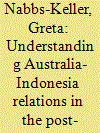

|
|
|
|
|
| Summary/Abstract |
Attributing the tempestuous nature of Australia-Indonesia relations to marked cultural differences is almost an article of faith in Australian foreign policy analysis. Indeed, policy and media commentary tends to depict the bilateral relationship as frequently in crisis and at risk of irreparable damage. This article contends that constructs which characterise Australia-Indonesia relations as especially fragile overlook powerful strategic imperatives as a basis for ongoing cooperation. The article examines two key variables shaping Australia-Indonesia relations in the post-authoritarian era—resilience and respect. A perceived lack of consultation by successive Australian Governments on policy announcements of vital national concern to Indonesia has been a catalyst for repeated bilateral tensions in the post-authoritarian era. This has been compounded by important shifts in Indonesia’s post-authoritarian polity and the state’s rising significance in international economic and political terms. The article concludes that in spite of periodic bilateral tensions, Indonesia-Australia relations have remained surprisingly resilient. Such resilience is based on an appreciation by foreign policy elites in both states about the relationship’s utility for maintaining stability and prosperity in a transitional Indo-Pacific order.
|
|
|
|
|
|
|
|
|
|
|
|
|
|
|
|
|
|
|
|
|